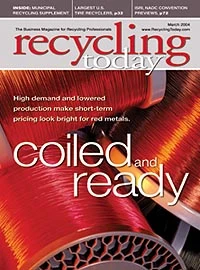Not all Americans are fond of their municipal recycling programs. Some see an inessential government service or an unneeded budget item, while those looking from the other end of the spectrum see programs that don’t address core resource conservation issues.
Bringing constituencies with such diverse viewpoints together is a difficult task to accomplish for any municipal planner or elected official. Yet both viewpoints may well miss the true value of recycling in today’s economy.
An amazing number of manufacturing jobs in the U.S. are now tied into the recycling industry. By percentage, the amount of steel, aluminum and other metals produced with scrap feedstock soared in the second half of the 20
th century. The same is true of most paper grades. While still just a seedling, the growth of scrap plastic as a production feedstock is also sprouting.Secondary commodity pricing trends demonstrate that American and global markets are hungry for scrap materials. Those who believe collected recyclables are used in a handful of offbeat, quirky ways are grossly ill informed.
The argument can and should be made that collecting residential recyclables provides a benefit to the U.S. economy similar to that of our Interstate highway system. The comparison can be valid in many ways.
While the government oversees highway planning and funding, the benefits of the highway system extend to private contractors who perform the work; to companies that supply the materials; and then to all businesses who transport goods from point A to point B.
Recycling can rightfully be considered in the same light. The government may pay the collection contracts, but private contractors perform (most of) the work; companies that obtain necessary industrial feedstocks benefit directly, as do all companies or citizens who buy products made from recycled materials or who are employed by these companies.
While the equation does not excuse mismanagement of recycling programs any more than it does the laying of shoddy pavement, it might help recycling advocates shape opinions.

Explore the March 2004 Issue
Check out more from this issue and find your next story to read.
Latest from Recycling Today
- BMW Group, Encory launch 'direct recycling’ of batteries
- Loom Carbon, RTI International partner to scale textile recycling technology
- Goodwill Industries of West Michigan, American Glass Mosaics partner to divert glass from landfill
- CARI forms federal advocacy partnership
- Monthly packaging papers shipments down in November
- STEEL Act aims to enhance trade enforcement to prevent dumping of steel in the US
- San Francisco schools introduce compostable lunch trays
- Aduro graduates from Shell GameChanger program





